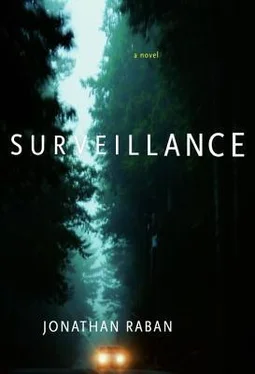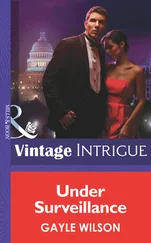“Rabbit—”
“Oh, yes, we’d love to have you over,” Minna said.
“Of course we’d love to come, but…can we talk about it later, on the phone?”
“Take your time,” Augie said. “No urgency about it. We’re on island time here.”
It was the second time he’d said that, and Lucy always found the phrase faintly annoying. Even people who lived on Bainbridge used it, smugly, to insinuate that the most technical of insularities was some kind of moral virtue to be paraded over mere mainlanders.
They left the house at 2:30. At 2:31, Alida began campaigning for a return to Useless Bay on Friday.
“Oh, maybe, Rabbit, maybe…But it’s difficult.”
“Why is it difficult?”
“It just is.”
In response, Alida wired herself to her iPod and turned the volume up so loud that Lucy could hear the thin, tinny dribble of teenage nihilism coming from the earphones.
“Sorry! I know that’s a lousy answer!”
Tinka-tinka-tinka-tinka-tinka-novocaine.
“Alida?”
But there was no reaching her. She might as well have been in Idaho, lips twitching to the lyrics, eyes half focused on the middle distance, left foot tapping in the footwell. She was gone.
There was a three-ferry wait at the terminal, where Alida tried to make overtures to a sniffer dog and was repulsed by its handler. Lucy made notes. “Memoirs are always tricky that way.” Talking of Anne Frank, had he really been speaking of himself and of multiple August Vanagses? She saw no obvious connection, but it was too hot to properly think. Ferry came and ferry went. The low-tide reek of drying bladder wrack grew steadily stronger as the water sank around the harbor pilings. The waiting cars kept their engines running for the air conditioning, filling the dead air with their fumes. At last the line began to move, and aboard the ferry there was blessed cool.
They sat by a window in the passenger lounge, next to a bulkhead. Alida — still wired — pointed approvingly to a framed notice that boasted, THIS FERRY IS POWERED BY SOYBEANS — BIODIESEL FUEL IN USE. Lucy responded with a thumbs-up sign and went on making notes. Maybe she’d have to learn sign language if she was to keep in meaningful communication with her daughter.
Halfway across Discovery Passage, she noticed for the second time the man in the Hawaiian shirt, jeans, and tightly buttoned poplin summer jacket. His tourist getup was at odds with his purposeful stride down the rows, eyes swiveling from passenger to passenger. On the instant that he registered Lucy and Alida, he appeared to cancel them from his attention. Then she saw the bulge in the jacket under his left armpit: a holstered sidearm.
An undercover marshal. Until now, she’d believed these guys were figments of Tad’s paranoid imagination. He claimed he’d seen them everywhere — on buses, ferries, and “all over” Pike Place Market. Sometimes he called them Stasi, sometimes just the secret police. Yeah, Tad. Go, Tad, go. She’d paid no attention. Now that she’d seen one for herself, she felt rebuked, like a doubting Thomas. Over her shoulder, she watched the man on his unrewarding beat. Whom was he hoping to catch? Bin Laden, returning from his weekend hideaway on Whidbey Island? Or perhaps his whole point, in his loud vacation gear, was not to observe but be observed, the watcher watched, as she was watching now.
“It happens slowly,” Tad had said, “so slowly you don’t see it happening. You think you’re living in a democracy, then one morning you wake up and realize it’s a fascist police state, and it’s been that way for years.”
But that was Tad, speaking from inside his world of dark “intel” and crazy theories garnered from the Internet. On the day Ronald Reagan died, he’d said matter-of-factly that of course Reagan had been dead for months, if not years, and that they’d been keeping his corpse on ice in readiness for a political emergency. They’d chosen to announce his death on that particular day in order to divert attention from some pickle that the president had gotten himself into over in Europe. All this Tad said as flatly as if he were reporting the weather forecast, which had made Lucy wonder for a moment if he might be clinically insane.
Whenever Tad got going on the federal government, Lucy bristled with unease. It was too damn close to Lewis Olson, his knee-jerk conviction that everyone in Washington, D.C., was conspiring to subvert the Constitution and enslave the American people. It was cheap and dangerous thinking, and she couldn’t count the hours she’d spent railing back at Tad, telling him he was no better than the Montana Militia with their kooky crap about black helicopters and the New World Order. “You and John Trochmann,” she said, “you’re like Tom Sawyer and Huck Finn.”
The guy in the Hawaiian shirt had taken a seat on the far side of the passenger lounge. Tiring of his search for terrorists, he was staring, or pretending to stare, at the crisscross wakes of pleasure boats as they stormed around the glassy sea. If they had undercover marshals on planes — which Lucy thought was okay, even reassuring — why shouldn’t they put them on the ferries? Just because you saw the occasional plainclothesman with a concealed gun didn’t mean the country was turning into a police state. The trouble with Tad was he had no sense of proportion. Michael had been the one with common sense, and after he died poor Tad, more often out of work than in, had tried to lose himself in cyberspace, where he was natural prey to all the psychos out there with their hot little secrets and spurious insider dirt.
On I-5, traffic was backed up from the checkpoint for the best part of a mile. Stewing in gridlock, Lucy was reminded of another of Tad’s unlikely stories, expounded over dinner as if it were gospel. There was a huge program to renew reflective lane markers on highways, ostensibly the baby of the Department of Transportation but known by Tad to have originated in the National Security Agency. These weren’t just any old lane markers; they were clandestine — you might say clairvoyant — lane markers that would track the number, make, and color of your car as it went by. When the system was complete, they’d be able to track the exact movements of every vehicle in the U.S. It was, Tad said, all done by microchips and wireless technology.
“Microchips? How could microchips do that?”
Tad, wearing the lofty smile of the privileged initiate, said, “You’d better ask the NSA that question.”
The uniformed boys at the checkpoint, faces red with sunburn, were surprisingly polite, considering the tormenting weather. One asked Alida what she was listening to.
Alida removed an earphone to say, “Good Charlotte. ‘Young and Hopeless.’”
“Cool. Okay, ma’am. Drive safe.”
Definitely not the manners of a police state.
She took the Union Street exit and drove into the muggy haze of downtown.
“Temperature inversion,” Alida said, at last breaking the long silence of the ride.
“What?”
“When warm air gets trapped by even warmer air in the upper atmosphere, so it can’t rise and all the pollution has nowhere to go. You know that just living in Seattle’s like smoking twelve cigarettes a day? I bet today it’s like smoking thirty. Yuck!”
“I never heard the cigarette thing.”
“We did it in Science. It’s really, really scary.”
“I’m afraid science is scary now. It never used to be. When I was in junior high in Miles City, it was always about exploring the wonders of the world. It’s so different for you guys — exploring all the terrors.”
“Thirty cigarettes a day. It’s the particulates in the air. You know what?”
“What, Rabbit?”
Читать дальше












